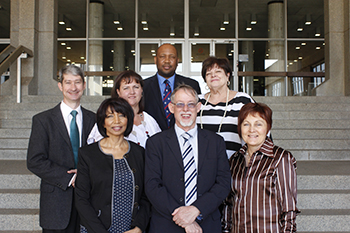Latest News Archive
Please select Category, Year, and then Month to display items
20 December 2019
|
Story Thabo Kessah
|
Photo Thabo Kessah
 Dr Deidré van Rooyen from the Centre for Development Support, Dr Jared McDonald (Department of History), Moodi Matsoso, and Bishop Billyboy Ramahlele with the mobile device.
Dr Deidré van Rooyen from the Centre for Development Support, Dr Jared McDonald (Department of History), Moodi Matsoso, and Bishop Billyboy Ramahlele with the mobile device.
In an effort to broaden the storytelling horizons and to answer to the demands of the Fourth Industrial Revolution, Community Engagement on the UFS Qwaqwa Campus recently launched the Digital Storytelling project, aimed at broadening access to good community stories.
“We have partnered with the Common Good First initiative to enhance the service that we provide as a department,” said Bishop Billyboy Ramahlele, Director: Community Engagement.
“We challenge all academics, support staff, the SRC and students in general, to take advantage of this channel to communicate their stories to the world,” he said.
Histories of royal families
“The digital documentation of the histories of the royal families in the Qwaqwa area is in the pipeline and will be conducted in partnership with the Department of History. We have come to realise that with times changing, the younger generation loses track of the precious histories, and this platform will help in preserving that,” he added.
Community Engagement coordinator, Moodi Matsoso, also revealed that space has been identified for the lab. “At the moment, we are operating on mobile digital storytelling devices, with all the necessary equipment such as tablets and cameras. However, we will soon have a fully-fledged lab on campus,” she said.
This project is co-funded by the Erasmus+ Programme of the European Union.
New schools, restructuring part of streamlined Faculty of Health Sciences
2017-10-12

From the left, front are: Dr Jocelyn Naicker,
Prof Gert van Zyl, Prof Magda Mulder;
back from left: Prof Chris Viljoen,
Marlene Viljoen, Deputy Director: Faculty of Health Sciences;
Prof Nathaniel Mofolo; and Prof Santie van Vuuren.
Photo: Rulanzen Martin
Numerous developments, such as the creation of two new schools and one newly restructured School of Medicine in the Faculty of Health Sciences at the University of the Free State (UFS), will catapult this renowned faculty to even greater heights.
Five-school structure to increase access
A five-school structure was proposed at the annual Faculty Management retreat in July 2016. The previous three-school model included the Schools of Medicine, Nursing, and Allied Health Professions.
The current School of Medicine has been restructured and will henceforth be known as the School of Clinical Medicine. The Schools of Pathology and Biomedical Sciences have been added to the faculty. “So, three new schools were in fact created within the faculty,” said Prof Gert van Zyl, Dean of the faculty.
“There was also a request from the National Health Laboratory Services to group academics that is rendering services in pathology into a new School of Pathology.” This is what motivated the faculty management to create two new schools.
Esteemed academics appointed
With the creation of the new schools, there were also new appointments within the Faculty of Health Sciences. Dr Jocelyn Naicker has been appointed as the new part-time Head of the School of Pathology, Prof Chris Viljoen was appointed as the part-time Head of the School of Biomedical Sciences, and Prof Nathaniel Mofolo as the new Head of the School of Clinical Medicine. Prof Santie van Vuuren remains Head of the School of Allied Health Professions, and Prof Magda Mulder as the head of the School of Nursing.
Research outputs to remain as usual
The addition of the new schools will not impact research output. “In the past, research was done across departmental boundaries between all the departments in the faculty,” Prof Van Zyl said. The advantages of adding two additional schools are that the workload will be distributed among the five schools. The heads of schools will work within their respective disciplines and related areas, and will eliminate the duplication of administrative functions.